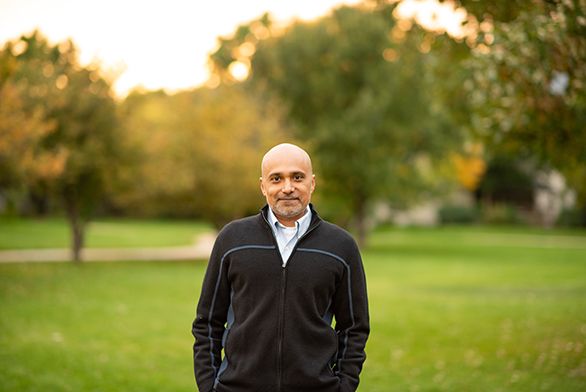Anant Vashi (SF96) Takes Philosophical Approach to Finance
September 8, 2021 | By Les Poling

Given the one-of-a-kind nature of St. John’s, many students end up at the college via surprisingly traditional means: they receive an admissions mailer and grow intrigued with the Program, for example, or they find out about the college from a teacher. Anant Vashi (SF96) was not one of those Johnnies.
“I transferred to St. John’s after one year at Georgetown University,” he recalls. Prior to his freshman year in Washington, DC, he had grown up in the private school system; an “overachieving” student on what he describes as a “myopic, career-focused path” that left him burnt out and intellectually dissatisfied.
“I was yearning for a more expansive perspective,” Vashi says. “I had always had a philosophical bent with a strong interest in history and economics. I decided that if any formal education was right for me, that it would be at a place like St. John’s.”
To complete the paradigm shift, he applied to the Santa Fe campus instead of nearby Annapolis; by fall, he was seated around the seminar table.
More than two decades later, the decision to transfer has paid off in more ways than one. “St. John’s College was a transformative personal and intellectual experience for me, and I would not be the person I am today had I attended another school,” Vashi says. While he loved reading the works of political philosophers like Machiavelli, Hobbes, Kant, Hegel, and Marx, the books and classes represented the spark—not the flame.
“The real learning at St. Johns occurs through interacting with and being challenged by your peers, whose backgrounds and attitudes can be very different than your own,” he notes.
Furthermore, Vashi suggests that St. John’s has facilitated a kind of mindfulness that helps him persevere under duress and produce high-quality work, whether as director in the transportation and logistics group at Capstone Headwaters—the independent middle market investment bank where he worked until January 2021—or as the vice president of finance at Neat Capital, a Boulder, Colorado-based growth stage mortgage lender.
Stereotypically, investment banking and home financing sound like fields for graduates with business and economics majors, not liberal arts degrees. Vashi is proof that’s not the case. In fact, he contends, his Johnnie education has helped him at every step of the way.
“At least to my observation, many people who go to college go through life in a sequential way, without taking the time to understand how it all fits together for them as a person,” he says. “St. Johns provided me with the tools and confidence to create an intellectual space between myself and the world whizzing by.”
That intellectual space—the ability to pause, reconsider basic assumptions, adapt to unforeseen circumstances, and ask “why?”—offers a sense of thoughtfulness and clarity that proves immensely beneficial, Vashi explains.
“[At Capstone Headwaters], clients repeatedly described how my abilities to step back, be measured, appreciate other perspectives, and be deliberate were qualities that really helped them through the transaction process,” he recalls. “Negotiating transactions worth tens of millions of dollars can be very tenuous and stressful, but I believe that the space that St. John’s taught me to make [was] critical to successful outcomes.”
Vashi now puts the same skills to use at Neat Capital, a venture-backed mortgage lender that aims to simplify the home financing process. As leader of the finance team, Vashi relies on his experience to help spur the company’s growth within the industry.
“I direct all finance and accounting-related activity for a fast-growing fintech platform, which is quite different than my previous work as a mergers and acquisitions transaction advisor,” he explains. “St. John’s provides the foundational perspective to pivot in the professional space, making it natural to apply one’s career knowledge and experience in new but related fields. No problem after jumping from Kant to Einstein in the same day.”
It all sounds very nuts-and-bolts—and intense. But for Vashi, the “intellectually rigorous” work that has defined his career connects deeply with his time at St. John’s. “[My job] is the real-world application of financial and economic theory,” he explains.
Putting foundational theory into practice: the practice of a true Johnnie.

